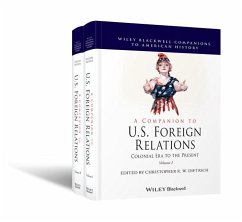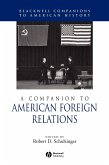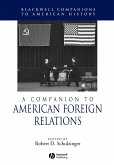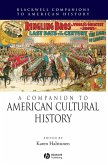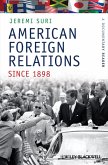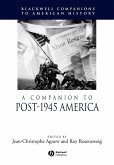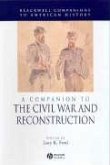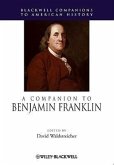A Companion to U.S. Foreign Relations
Colonial Era to the Present
Herausgeber: Dietrich, Christopher R W
A Companion to U.S. Foreign Relations
Colonial Era to the Present
Herausgeber: Dietrich, Christopher R W
- Gebundenes Buch
Andere Kunden interessierten sich auch für
![A Companion to American Foreign Relations A Companion to American Foreign Relations]() Robert Schulzinger (ed.)A Companion to American Foreign Relations282,99 €
Robert Schulzinger (ed.)A Companion to American Foreign Relations282,99 €![A Companion to American Foreign Relations A Companion to American Foreign Relations]() D Robert SchulzingerA Companion to American Foreign Relations77,99 €
D Robert SchulzingerA Companion to American Foreign Relations77,99 €![A Companion to American Cultural History A Companion to American Cultural History]() Karen Halttunen (ed.)A Companion to American Cultural History297,99 €
Karen Halttunen (ed.)A Companion to American Cultural History297,99 €![American Foreign Relations Since 1898 American Foreign Relations Since 1898]() American Foreign Relations Since 1898161,99 €
American Foreign Relations Since 1898161,99 €![A Companion to Post-1945 America A Companion to Post-1945 America]() JEAN CHRISTOPHE AGNEWA Companion to Post-1945 America75,99 €
JEAN CHRISTOPHE AGNEWA Companion to Post-1945 America75,99 €![A Companion to the Civil War and Reconstruction A Companion to the Civil War and Reconstruction]() LACY FORD (ed.)A Companion to the Civil War and Reconstruction280,99 €
LACY FORD (ed.)A Companion to the Civil War and Reconstruction280,99 €![A Companion to Benjamin Franklin A Companion to Benjamin Franklin]() A Companion to Benjamin Franklin268,99 €
A Companion to Benjamin Franklin268,99 €-
-
-
Produktdetails
- Verlag: Wiley
- Seitenzahl: 1184
- Erscheinungstermin: 24. März 2020
- Englisch
- Abmessung: 254mm x 175mm x 51mm
- Gewicht: 1905g
- ISBN-13: 9781119166108
- ISBN-10: 1119166101
- Artikelnr.: 59748156
Hinweis: Dieser Artikel kann nur an eine deutsche Lieferadresse ausgeliefert werden.
- Herstellerkennzeichnung
- Libri GmbH
- Europaallee 1
- 36244 Bad Hersfeld
- gpsr@libri.de
Christopher R. W. Dietrich is Associate Professor of History and Director of American Studies at Fordham University. The author of Oil Revolution (2017), he specializes in the history of U.S. foreign relations, intellectual history, the history of decolonization, and the history of capitalism. Professor Dietrich has won fellowships and awards from the National History Center, the Woodrow Wilson Foundation, the Society for Historians of American Foreign Relations, and the American Historical Association.
Volume I: Colonial Era to the Twentieth Century
Chapter 1 Imperial Crisis, Revolution, and a New Nation, 1763 to 1803
David Narrett, The University of Texas at Arlington
Chapter 2 The Early Republic in a World of Empire, 1787 to 1848
Emily Conroy-Krutz, Michigan State University
Chapter 3 Time, Talent, and Treasure: Philanthropy in the Early Republic
Annelise Hanson Shrout, University of California Fullerton
Chapter 4 The Articles of Confederation State-System, Early American
International Systems, and Antebellum Foreign Policy Analytical Frameworks
Robbie J. Totten, American Jewish University
Chapter 5 Natural Rights: Haitian-American Diplomacy in the Age of Atlantic
Revolutions
Ronald Angelo Johnson, Texas State University
Chapter 6 Towards a "New Indian History" of Foreign Relations:
U.S.-American Indian Diplomacy from Greenville to Wounded Knee, 1795-1890
Elspeth Martini, Montclair State University
Chapter 7 Many Manifest Destinies
Brian Rouleau, Texas A&M University
Chapter 8 New Research Avenues: U.S. Foreign Relations in the Late
Antebellum and the Civil War Era
Phil Magness, American Institute for Economic Research
Chapter 9 Ideology and Interest: The Civil War, U.S. Foreign Affairs, and
the World
Andre Fleche, Castleton University
Chapter 10 The United States: Imperium in Imperio in an Age of Imperialism,
1865-1886
Daniel Margolies, Virginia Wesleyan University
Chapter 11 New Frontiers Beyond the Seas: The Culture of American Empire
and Expansion at the Turn of the Twentieth Century
Sarah Steinbock-Pratt, University of Alabama
Chapter 12 Connection and Disruption: American Industrialization and the
World, 1865-1917
Peter A. Shulman, Case Western Reserve University
Chapter 13 The Open Door Empire
Marc-William Palen, University of Exeter
Chapter 14 The Statecraft of Theodore Roosevelt and America's Rise to World
Power
Charles Laderman, King's College - London
Chapter 15 Wilson's Wartime Diplomacy: The United States and the First
World War, 1914 to 1918
Ross Kennedy, Illinois State University
Chapter 16 Responding to a Revolution: The "Mexican Question" in the United
States
Christy Thornton, Johns Hopkins University
Chapter 17 Chrysalis of Power: United States Foreign Policy and the Retreat
from Isolationism, 1919-1941
B.J.C. McKercher, University of Victoria
Chapter 18 Insulation: The Presidency of Franklin D. Roosevelt during the
Years from 1933 to 1941
Kirin Klaus Patel, Maastricht University
Chapter 19 The United States and International Law, 1776 to 1939
Benjamin A. Coates, Wake Forest University
Chapter 20 U.S. Foreign Relations during World War II
Andrew Johnstone, University of Leicester
Chapter 21 Rival and Parallel Missions: America and Soviet Russia, 1917 to
1945
David S. Fogelsong, Rutgers University
Chapter 22 The United States, Transnationalism, and the Jewish Question,
1917 to 1948
Sonja Wentling, Concordia University
Chapter 23 Migrants and Transnational Networks in Sino-American Relations
in the Nineteenth and Twentieth Centuries
Meredith Oyen, University of Maryland - Baltimore County
Chapter 24 The Burden of Empire: The US in the Philippines, 1898 to 1965
Colleen Woods, University of Maryland - Baltimore County
Chapter 25 A History of U.S. International Policing
Katherine Unterman, Texas A&M University
Volume II: The Twentieth and Twenty-First Centuries
Chapter 26 Black Internationalism from Berlin to Black Lives Matter
Brandon R. Byrd, Vanderbilt University
Chapter 27 Drugs, Empire, and U.S. Foreign Policy
April Merleaux, Hampshire College
Chapter 28 Military Bases and Overseas Occupation in 20th Century U.S.
Foreign Relations
Zach Fredman, Duke Kunshan University
Chapter 29 Remaking the World: The United States and International
Development, 1898 to 2015
Stephen Macekura, University of Indiana
Chapter 30 The Early Cold War: Studies of Cold War America in the 21st
Century
Masuda Hajimu, National University of Singapore
Chapter 31 United States Power in a Material World
Andrew Friedman, Haverford College
Chapter 32 Propaganda in the Best Sense of the Word? Public Diplomacy and
U.S. Diplomatic History since World War I
Sarah Ellen Graham, U.S. Studies Centre, University of Sydney
Chapter 33 Waging War with Words, 1945 to 1963
Lori Clune, California State University, Fresno
Chapter 34 Between Two Ages: United States, Decolonization, and
Globalization in the Long Sixties
Ryan Irwin, University at Albany - SUNY
Chapter 35 Foreign Policy in the "Backyard": The Historiography of US-Latin
American Relations in the Mid-Twentieth Century
James F. Siekmeier, West Virginia University
Chapter 36 U.S. Culture and the Cuban Revolution
John A. Gronbeck-Tedesco, Ramapo College
Chapter 37 After the Panic: Writing the History of U.S.-Japan Relations
since the Occupation
Andrew McKevitt, Louisiana Tech University
Chapter 38 The Nuclear Revolution in American Foreign Policy during the
Cold War
Jonathan Reid Hunt, Southampton University
Chapter 39 Against the Bomb: Nuclear Disarmament and Domestic Politics
Paul Rubinson, Bridgewater College
Chapter 40 Interminable: The Historiography of the Vietnam War, 1945 to
1975
Simon Toner, University of Sheffield
Chapter 41 The Cold War in Sub-Saharan Africa
Phillip Muehlenbeck, George Washington University
Chapter 42 The United States and the Arab-Israeli Conflict, 1948 to 1982
Craig Daigle, City College of New York
Chapter 43 Mineral Frontiers in the Twentieth Century
Megan Black, London School of Economics
Chapter 44 Oil and U.S. Foreign Relations
Victor McFarland, University of Missouri
Chapter 45 Oil, Empire, and Covert Action: New Directions in the
Historiography of US-Iraqi Relations
Brandon Wolfe-Hunnicutt, California State University, Stanislaus
Chapter 46 Iran and the Academy: Intellectual Paths to and from Revolution
in the United States
Matthew K. Shannon, Emory & Henry College
Chapter 47 The United States and Afghanistan: Ambiguity and Impasse,
1945-2015
Elisabeth Leake, Leeds University
Chapter 48 Ambivalent Partnerships, Enduring Dilemmas: The United States,
India, and Pakistan after Partition
Robert Rakove, Stanford University
Chapter 49 Transnational Activism in U.S.-Central America Relations in the
1980s
Theresa Keeley, University of Louisville
Chapter 50 The Reagan Administration and the World, 1981-1988
James Graham Wilson, Historian's Office, Department of State
Chapter 51 The Changing History of the End of the Cold War
Sarah B. Snyder, American University
Chapter 52 The Obama Era: Retrenchment and the Challenge of a
"Post-American" World, 2009-2017
Robert S. Singh, University of London
Chapter 1 Imperial Crisis, Revolution, and a New Nation, 1763 to 1803
David Narrett, The University of Texas at Arlington
Chapter 2 The Early Republic in a World of Empire, 1787 to 1848
Emily Conroy-Krutz, Michigan State University
Chapter 3 Time, Talent, and Treasure: Philanthropy in the Early Republic
Annelise Hanson Shrout, University of California Fullerton
Chapter 4 The Articles of Confederation State-System, Early American
International Systems, and Antebellum Foreign Policy Analytical Frameworks
Robbie J. Totten, American Jewish University
Chapter 5 Natural Rights: Haitian-American Diplomacy in the Age of Atlantic
Revolutions
Ronald Angelo Johnson, Texas State University
Chapter 6 Towards a "New Indian History" of Foreign Relations:
U.S.-American Indian Diplomacy from Greenville to Wounded Knee, 1795-1890
Elspeth Martini, Montclair State University
Chapter 7 Many Manifest Destinies
Brian Rouleau, Texas A&M University
Chapter 8 New Research Avenues: U.S. Foreign Relations in the Late
Antebellum and the Civil War Era
Phil Magness, American Institute for Economic Research
Chapter 9 Ideology and Interest: The Civil War, U.S. Foreign Affairs, and
the World
Andre Fleche, Castleton University
Chapter 10 The United States: Imperium in Imperio in an Age of Imperialism,
1865-1886
Daniel Margolies, Virginia Wesleyan University
Chapter 11 New Frontiers Beyond the Seas: The Culture of American Empire
and Expansion at the Turn of the Twentieth Century
Sarah Steinbock-Pratt, University of Alabama
Chapter 12 Connection and Disruption: American Industrialization and the
World, 1865-1917
Peter A. Shulman, Case Western Reserve University
Chapter 13 The Open Door Empire
Marc-William Palen, University of Exeter
Chapter 14 The Statecraft of Theodore Roosevelt and America's Rise to World
Power
Charles Laderman, King's College - London
Chapter 15 Wilson's Wartime Diplomacy: The United States and the First
World War, 1914 to 1918
Ross Kennedy, Illinois State University
Chapter 16 Responding to a Revolution: The "Mexican Question" in the United
States
Christy Thornton, Johns Hopkins University
Chapter 17 Chrysalis of Power: United States Foreign Policy and the Retreat
from Isolationism, 1919-1941
B.J.C. McKercher, University of Victoria
Chapter 18 Insulation: The Presidency of Franklin D. Roosevelt during the
Years from 1933 to 1941
Kirin Klaus Patel, Maastricht University
Chapter 19 The United States and International Law, 1776 to 1939
Benjamin A. Coates, Wake Forest University
Chapter 20 U.S. Foreign Relations during World War II
Andrew Johnstone, University of Leicester
Chapter 21 Rival and Parallel Missions: America and Soviet Russia, 1917 to
1945
David S. Fogelsong, Rutgers University
Chapter 22 The United States, Transnationalism, and the Jewish Question,
1917 to 1948
Sonja Wentling, Concordia University
Chapter 23 Migrants and Transnational Networks in Sino-American Relations
in the Nineteenth and Twentieth Centuries
Meredith Oyen, University of Maryland - Baltimore County
Chapter 24 The Burden of Empire: The US in the Philippines, 1898 to 1965
Colleen Woods, University of Maryland - Baltimore County
Chapter 25 A History of U.S. International Policing
Katherine Unterman, Texas A&M University
Volume II: The Twentieth and Twenty-First Centuries
Chapter 26 Black Internationalism from Berlin to Black Lives Matter
Brandon R. Byrd, Vanderbilt University
Chapter 27 Drugs, Empire, and U.S. Foreign Policy
April Merleaux, Hampshire College
Chapter 28 Military Bases and Overseas Occupation in 20th Century U.S.
Foreign Relations
Zach Fredman, Duke Kunshan University
Chapter 29 Remaking the World: The United States and International
Development, 1898 to 2015
Stephen Macekura, University of Indiana
Chapter 30 The Early Cold War: Studies of Cold War America in the 21st
Century
Masuda Hajimu, National University of Singapore
Chapter 31 United States Power in a Material World
Andrew Friedman, Haverford College
Chapter 32 Propaganda in the Best Sense of the Word? Public Diplomacy and
U.S. Diplomatic History since World War I
Sarah Ellen Graham, U.S. Studies Centre, University of Sydney
Chapter 33 Waging War with Words, 1945 to 1963
Lori Clune, California State University, Fresno
Chapter 34 Between Two Ages: United States, Decolonization, and
Globalization in the Long Sixties
Ryan Irwin, University at Albany - SUNY
Chapter 35 Foreign Policy in the "Backyard": The Historiography of US-Latin
American Relations in the Mid-Twentieth Century
James F. Siekmeier, West Virginia University
Chapter 36 U.S. Culture and the Cuban Revolution
John A. Gronbeck-Tedesco, Ramapo College
Chapter 37 After the Panic: Writing the History of U.S.-Japan Relations
since the Occupation
Andrew McKevitt, Louisiana Tech University
Chapter 38 The Nuclear Revolution in American Foreign Policy during the
Cold War
Jonathan Reid Hunt, Southampton University
Chapter 39 Against the Bomb: Nuclear Disarmament and Domestic Politics
Paul Rubinson, Bridgewater College
Chapter 40 Interminable: The Historiography of the Vietnam War, 1945 to
1975
Simon Toner, University of Sheffield
Chapter 41 The Cold War in Sub-Saharan Africa
Phillip Muehlenbeck, George Washington University
Chapter 42 The United States and the Arab-Israeli Conflict, 1948 to 1982
Craig Daigle, City College of New York
Chapter 43 Mineral Frontiers in the Twentieth Century
Megan Black, London School of Economics
Chapter 44 Oil and U.S. Foreign Relations
Victor McFarland, University of Missouri
Chapter 45 Oil, Empire, and Covert Action: New Directions in the
Historiography of US-Iraqi Relations
Brandon Wolfe-Hunnicutt, California State University, Stanislaus
Chapter 46 Iran and the Academy: Intellectual Paths to and from Revolution
in the United States
Matthew K. Shannon, Emory & Henry College
Chapter 47 The United States and Afghanistan: Ambiguity and Impasse,
1945-2015
Elisabeth Leake, Leeds University
Chapter 48 Ambivalent Partnerships, Enduring Dilemmas: The United States,
India, and Pakistan after Partition
Robert Rakove, Stanford University
Chapter 49 Transnational Activism in U.S.-Central America Relations in the
1980s
Theresa Keeley, University of Louisville
Chapter 50 The Reagan Administration and the World, 1981-1988
James Graham Wilson, Historian's Office, Department of State
Chapter 51 The Changing History of the End of the Cold War
Sarah B. Snyder, American University
Chapter 52 The Obama Era: Retrenchment and the Challenge of a
"Post-American" World, 2009-2017
Robert S. Singh, University of London
Volume I: Colonial Era to the Twentieth Century
Chapter 1 Imperial Crisis, Revolution, and a New Nation, 1763 to 1803
David Narrett, The University of Texas at Arlington
Chapter 2 The Early Republic in a World of Empire, 1787 to 1848
Emily Conroy-Krutz, Michigan State University
Chapter 3 Time, Talent, and Treasure: Philanthropy in the Early Republic
Annelise Hanson Shrout, University of California Fullerton
Chapter 4 The Articles of Confederation State-System, Early American
International Systems, and Antebellum Foreign Policy Analytical Frameworks
Robbie J. Totten, American Jewish University
Chapter 5 Natural Rights: Haitian-American Diplomacy in the Age of Atlantic
Revolutions
Ronald Angelo Johnson, Texas State University
Chapter 6 Towards a "New Indian History" of Foreign Relations:
U.S.-American Indian Diplomacy from Greenville to Wounded Knee, 1795-1890
Elspeth Martini, Montclair State University
Chapter 7 Many Manifest Destinies
Brian Rouleau, Texas A&M University
Chapter 8 New Research Avenues: U.S. Foreign Relations in the Late
Antebellum and the Civil War Era
Phil Magness, American Institute for Economic Research
Chapter 9 Ideology and Interest: The Civil War, U.S. Foreign Affairs, and
the World
Andre Fleche, Castleton University
Chapter 10 The United States: Imperium in Imperio in an Age of Imperialism,
1865-1886
Daniel Margolies, Virginia Wesleyan University
Chapter 11 New Frontiers Beyond the Seas: The Culture of American Empire
and Expansion at the Turn of the Twentieth Century
Sarah Steinbock-Pratt, University of Alabama
Chapter 12 Connection and Disruption: American Industrialization and the
World, 1865-1917
Peter A. Shulman, Case Western Reserve University
Chapter 13 The Open Door Empire
Marc-William Palen, University of Exeter
Chapter 14 The Statecraft of Theodore Roosevelt and America's Rise to World
Power
Charles Laderman, King's College - London
Chapter 15 Wilson's Wartime Diplomacy: The United States and the First
World War, 1914 to 1918
Ross Kennedy, Illinois State University
Chapter 16 Responding to a Revolution: The "Mexican Question" in the United
States
Christy Thornton, Johns Hopkins University
Chapter 17 Chrysalis of Power: United States Foreign Policy and the Retreat
from Isolationism, 1919-1941
B.J.C. McKercher, University of Victoria
Chapter 18 Insulation: The Presidency of Franklin D. Roosevelt during the
Years from 1933 to 1941
Kirin Klaus Patel, Maastricht University
Chapter 19 The United States and International Law, 1776 to 1939
Benjamin A. Coates, Wake Forest University
Chapter 20 U.S. Foreign Relations during World War II
Andrew Johnstone, University of Leicester
Chapter 21 Rival and Parallel Missions: America and Soviet Russia, 1917 to
1945
David S. Fogelsong, Rutgers University
Chapter 22 The United States, Transnationalism, and the Jewish Question,
1917 to 1948
Sonja Wentling, Concordia University
Chapter 23 Migrants and Transnational Networks in Sino-American Relations
in the Nineteenth and Twentieth Centuries
Meredith Oyen, University of Maryland - Baltimore County
Chapter 24 The Burden of Empire: The US in the Philippines, 1898 to 1965
Colleen Woods, University of Maryland - Baltimore County
Chapter 25 A History of U.S. International Policing
Katherine Unterman, Texas A&M University
Volume II: The Twentieth and Twenty-First Centuries
Chapter 26 Black Internationalism from Berlin to Black Lives Matter
Brandon R. Byrd, Vanderbilt University
Chapter 27 Drugs, Empire, and U.S. Foreign Policy
April Merleaux, Hampshire College
Chapter 28 Military Bases and Overseas Occupation in 20th Century U.S.
Foreign Relations
Zach Fredman, Duke Kunshan University
Chapter 29 Remaking the World: The United States and International
Development, 1898 to 2015
Stephen Macekura, University of Indiana
Chapter 30 The Early Cold War: Studies of Cold War America in the 21st
Century
Masuda Hajimu, National University of Singapore
Chapter 31 United States Power in a Material World
Andrew Friedman, Haverford College
Chapter 32 Propaganda in the Best Sense of the Word? Public Diplomacy and
U.S. Diplomatic History since World War I
Sarah Ellen Graham, U.S. Studies Centre, University of Sydney
Chapter 33 Waging War with Words, 1945 to 1963
Lori Clune, California State University, Fresno
Chapter 34 Between Two Ages: United States, Decolonization, and
Globalization in the Long Sixties
Ryan Irwin, University at Albany - SUNY
Chapter 35 Foreign Policy in the "Backyard": The Historiography of US-Latin
American Relations in the Mid-Twentieth Century
James F. Siekmeier, West Virginia University
Chapter 36 U.S. Culture and the Cuban Revolution
John A. Gronbeck-Tedesco, Ramapo College
Chapter 37 After the Panic: Writing the History of U.S.-Japan Relations
since the Occupation
Andrew McKevitt, Louisiana Tech University
Chapter 38 The Nuclear Revolution in American Foreign Policy during the
Cold War
Jonathan Reid Hunt, Southampton University
Chapter 39 Against the Bomb: Nuclear Disarmament and Domestic Politics
Paul Rubinson, Bridgewater College
Chapter 40 Interminable: The Historiography of the Vietnam War, 1945 to
1975
Simon Toner, University of Sheffield
Chapter 41 The Cold War in Sub-Saharan Africa
Phillip Muehlenbeck, George Washington University
Chapter 42 The United States and the Arab-Israeli Conflict, 1948 to 1982
Craig Daigle, City College of New York
Chapter 43 Mineral Frontiers in the Twentieth Century
Megan Black, London School of Economics
Chapter 44 Oil and U.S. Foreign Relations
Victor McFarland, University of Missouri
Chapter 45 Oil, Empire, and Covert Action: New Directions in the
Historiography of US-Iraqi Relations
Brandon Wolfe-Hunnicutt, California State University, Stanislaus
Chapter 46 Iran and the Academy: Intellectual Paths to and from Revolution
in the United States
Matthew K. Shannon, Emory & Henry College
Chapter 47 The United States and Afghanistan: Ambiguity and Impasse,
1945-2015
Elisabeth Leake, Leeds University
Chapter 48 Ambivalent Partnerships, Enduring Dilemmas: The United States,
India, and Pakistan after Partition
Robert Rakove, Stanford University
Chapter 49 Transnational Activism in U.S.-Central America Relations in the
1980s
Theresa Keeley, University of Louisville
Chapter 50 The Reagan Administration and the World, 1981-1988
James Graham Wilson, Historian's Office, Department of State
Chapter 51 The Changing History of the End of the Cold War
Sarah B. Snyder, American University
Chapter 52 The Obama Era: Retrenchment and the Challenge of a
"Post-American" World, 2009-2017
Robert S. Singh, University of London
Chapter 1 Imperial Crisis, Revolution, and a New Nation, 1763 to 1803
David Narrett, The University of Texas at Arlington
Chapter 2 The Early Republic in a World of Empire, 1787 to 1848
Emily Conroy-Krutz, Michigan State University
Chapter 3 Time, Talent, and Treasure: Philanthropy in the Early Republic
Annelise Hanson Shrout, University of California Fullerton
Chapter 4 The Articles of Confederation State-System, Early American
International Systems, and Antebellum Foreign Policy Analytical Frameworks
Robbie J. Totten, American Jewish University
Chapter 5 Natural Rights: Haitian-American Diplomacy in the Age of Atlantic
Revolutions
Ronald Angelo Johnson, Texas State University
Chapter 6 Towards a "New Indian History" of Foreign Relations:
U.S.-American Indian Diplomacy from Greenville to Wounded Knee, 1795-1890
Elspeth Martini, Montclair State University
Chapter 7 Many Manifest Destinies
Brian Rouleau, Texas A&M University
Chapter 8 New Research Avenues: U.S. Foreign Relations in the Late
Antebellum and the Civil War Era
Phil Magness, American Institute for Economic Research
Chapter 9 Ideology and Interest: The Civil War, U.S. Foreign Affairs, and
the World
Andre Fleche, Castleton University
Chapter 10 The United States: Imperium in Imperio in an Age of Imperialism,
1865-1886
Daniel Margolies, Virginia Wesleyan University
Chapter 11 New Frontiers Beyond the Seas: The Culture of American Empire
and Expansion at the Turn of the Twentieth Century
Sarah Steinbock-Pratt, University of Alabama
Chapter 12 Connection and Disruption: American Industrialization and the
World, 1865-1917
Peter A. Shulman, Case Western Reserve University
Chapter 13 The Open Door Empire
Marc-William Palen, University of Exeter
Chapter 14 The Statecraft of Theodore Roosevelt and America's Rise to World
Power
Charles Laderman, King's College - London
Chapter 15 Wilson's Wartime Diplomacy: The United States and the First
World War, 1914 to 1918
Ross Kennedy, Illinois State University
Chapter 16 Responding to a Revolution: The "Mexican Question" in the United
States
Christy Thornton, Johns Hopkins University
Chapter 17 Chrysalis of Power: United States Foreign Policy and the Retreat
from Isolationism, 1919-1941
B.J.C. McKercher, University of Victoria
Chapter 18 Insulation: The Presidency of Franklin D. Roosevelt during the
Years from 1933 to 1941
Kirin Klaus Patel, Maastricht University
Chapter 19 The United States and International Law, 1776 to 1939
Benjamin A. Coates, Wake Forest University
Chapter 20 U.S. Foreign Relations during World War II
Andrew Johnstone, University of Leicester
Chapter 21 Rival and Parallel Missions: America and Soviet Russia, 1917 to
1945
David S. Fogelsong, Rutgers University
Chapter 22 The United States, Transnationalism, and the Jewish Question,
1917 to 1948
Sonja Wentling, Concordia University
Chapter 23 Migrants and Transnational Networks in Sino-American Relations
in the Nineteenth and Twentieth Centuries
Meredith Oyen, University of Maryland - Baltimore County
Chapter 24 The Burden of Empire: The US in the Philippines, 1898 to 1965
Colleen Woods, University of Maryland - Baltimore County
Chapter 25 A History of U.S. International Policing
Katherine Unterman, Texas A&M University
Volume II: The Twentieth and Twenty-First Centuries
Chapter 26 Black Internationalism from Berlin to Black Lives Matter
Brandon R. Byrd, Vanderbilt University
Chapter 27 Drugs, Empire, and U.S. Foreign Policy
April Merleaux, Hampshire College
Chapter 28 Military Bases and Overseas Occupation in 20th Century U.S.
Foreign Relations
Zach Fredman, Duke Kunshan University
Chapter 29 Remaking the World: The United States and International
Development, 1898 to 2015
Stephen Macekura, University of Indiana
Chapter 30 The Early Cold War: Studies of Cold War America in the 21st
Century
Masuda Hajimu, National University of Singapore
Chapter 31 United States Power in a Material World
Andrew Friedman, Haverford College
Chapter 32 Propaganda in the Best Sense of the Word? Public Diplomacy and
U.S. Diplomatic History since World War I
Sarah Ellen Graham, U.S. Studies Centre, University of Sydney
Chapter 33 Waging War with Words, 1945 to 1963
Lori Clune, California State University, Fresno
Chapter 34 Between Two Ages: United States, Decolonization, and
Globalization in the Long Sixties
Ryan Irwin, University at Albany - SUNY
Chapter 35 Foreign Policy in the "Backyard": The Historiography of US-Latin
American Relations in the Mid-Twentieth Century
James F. Siekmeier, West Virginia University
Chapter 36 U.S. Culture and the Cuban Revolution
John A. Gronbeck-Tedesco, Ramapo College
Chapter 37 After the Panic: Writing the History of U.S.-Japan Relations
since the Occupation
Andrew McKevitt, Louisiana Tech University
Chapter 38 The Nuclear Revolution in American Foreign Policy during the
Cold War
Jonathan Reid Hunt, Southampton University
Chapter 39 Against the Bomb: Nuclear Disarmament and Domestic Politics
Paul Rubinson, Bridgewater College
Chapter 40 Interminable: The Historiography of the Vietnam War, 1945 to
1975
Simon Toner, University of Sheffield
Chapter 41 The Cold War in Sub-Saharan Africa
Phillip Muehlenbeck, George Washington University
Chapter 42 The United States and the Arab-Israeli Conflict, 1948 to 1982
Craig Daigle, City College of New York
Chapter 43 Mineral Frontiers in the Twentieth Century
Megan Black, London School of Economics
Chapter 44 Oil and U.S. Foreign Relations
Victor McFarland, University of Missouri
Chapter 45 Oil, Empire, and Covert Action: New Directions in the
Historiography of US-Iraqi Relations
Brandon Wolfe-Hunnicutt, California State University, Stanislaus
Chapter 46 Iran and the Academy: Intellectual Paths to and from Revolution
in the United States
Matthew K. Shannon, Emory & Henry College
Chapter 47 The United States and Afghanistan: Ambiguity and Impasse,
1945-2015
Elisabeth Leake, Leeds University
Chapter 48 Ambivalent Partnerships, Enduring Dilemmas: The United States,
India, and Pakistan after Partition
Robert Rakove, Stanford University
Chapter 49 Transnational Activism in U.S.-Central America Relations in the
1980s
Theresa Keeley, University of Louisville
Chapter 50 The Reagan Administration and the World, 1981-1988
James Graham Wilson, Historian's Office, Department of State
Chapter 51 The Changing History of the End of the Cold War
Sarah B. Snyder, American University
Chapter 52 The Obama Era: Retrenchment and the Challenge of a
"Post-American" World, 2009-2017
Robert S. Singh, University of London

